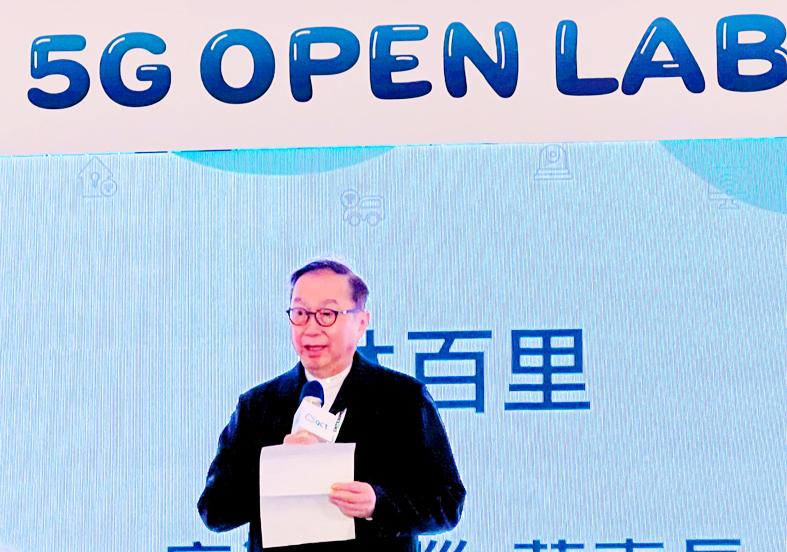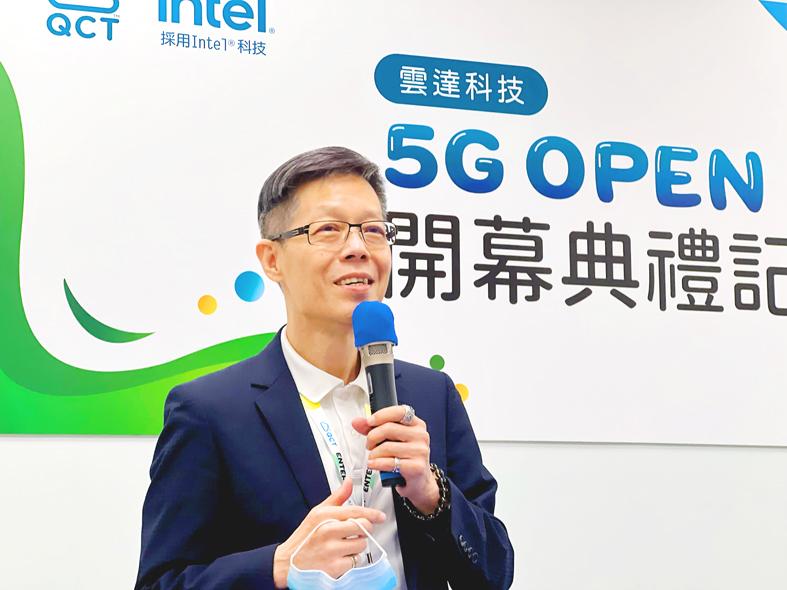Quanta Cloud Technology (QCT, 雲達科技), a server unit of Quanta Computer Inc (廣達電腦), yesterday said it would accelerate its expansion of capacity next year to catch up with growing demand for servers and cloud-computing products.
QCT has two new investments in the US totaling US$42 million to fund the expansion of laptop and server assembly lines, and to “support the future growth of our server business,” QCT president Mike Yang (楊麒令) said.
“We are also adding a new factory in Thailand and preparing for capacity expansion in Europe,” Yang said. “We are investing in a promising future.”

Photo: CNA
In total, QCT plans to introduce more than 10 new production lines next year, Yang told a media briefing, following the launch of the company’s first 5G Open Lab in New Taipei City’s Linkou District (林口) in collaboration with Intel Corp.
The lab would assist partners in carrying out end-to-end integrated development and testing on a private 5G network set up by QCT, and would serve as an incubation center for 5G solutions, the company said.
Yesterday at the lab, QCT demonstrated how smart manufacturing works on 5G enterprise private networks. The lab offers services for customers from Taiwan, Japan, Singapore and South Korea.

Photo: CNA
To meet demand from more customers, the company plans to open a similar lab in Germany next year and another one in the US, Yang said.
Despite the challenges ahead, the company has landed “more orders for next year than this year,” Quanta chairman Barry Lam (林百里) said
“Some customers placed orders for the whole of next year, or even for the next two years. This is the first time in Quanta’s 30-year history that we have seen short supply and such a long period of ordering,” Lam said.
Next year, the supply of materials and components should gradually improve, although it could remain a concern, Lam said.
Quanta is facing a less severe situation than other firms, given its large-scale production and prestigious customers, he added.
Lam said that Quanta should see continued revenue growth for the whole of this year, after revenue increased 2.41 percent to NT$1 trillion (US$36.08 billion) in the first 11 months, up from NT$981.04 billion for the same period last year.
Asked what he thought of the metaverse, Lam said Quanta is ready with augmented-reality and virtual-reality devices, and hopes to create more business opportunities through the 5G lab.

Application-specific integrated circuit designer Faraday Technology Corp (智原) yesterday said that although revenue this quarter would decline 30 percent from last quarter, it retained its full-year forecast of revenue growth of 100 percent. The company attributed the quarterly drop to a slowdown in customers’ production of chips using Faraday’s advanced packaging technology. The company is still confident about its revenue growth this year, given its strong “design-win” — or the projects it won to help customers design their chips, Faraday president Steve Wang (王國雍) told an online earnings conference. “The design-win this year is better than we expected. We believe we will win

Intel Corp chief executive officer Lip-Bu Tan (陳立武) is expected to meet with Taiwanese suppliers next month in conjunction with the opening of the Computex Taipei trade show, supply chain sources said on Monday. The visit, the first for Tan to Taiwan since assuming his new post last month, would be aimed at enhancing Intel’s ties with suppliers in Taiwan as he attempts to help turn around the struggling US chipmaker, the sources said. Tan is to hold a banquet to celebrate Intel’s 40-year presence in Taiwan before Computex opens on May 20 and invite dozens of Taiwanese suppliers to exchange views

Chizuko Kimura has become the first female sushi chef in the world to win a Michelin star, fulfilling a promise she made to her dying husband to continue his legacy. The 54-year-old Japanese chef regained the Michelin star her late husband, Shunei Kimura, won three years ago for their Sushi Shunei restaurant in Paris. For Shunei Kimura, the star was a dream come true. However, the joy was short-lived. He died from cancer just three months later in June 2022. He was 65. The following year, the restaurant in the heart of Montmartre lost its star rating. Chizuko Kimura insisted that the new star is still down

While China’s leaders use their economic and political might to fight US President Donald Trump’s trade war “to the end,” its army of social media soldiers are embarking on a more humorous campaign online. Trump’s tariff blitz has seen Washington and Beijing impose eye-watering duties on imports from the other, fanning a standoff between the economic superpowers that has sparked global recession fears and sent markets into a tailspin. Trump says his policy is a response to years of being “ripped off” by other countries and aims to bring manufacturing to the US, forcing companies to employ US workers. However, China’s online warriors